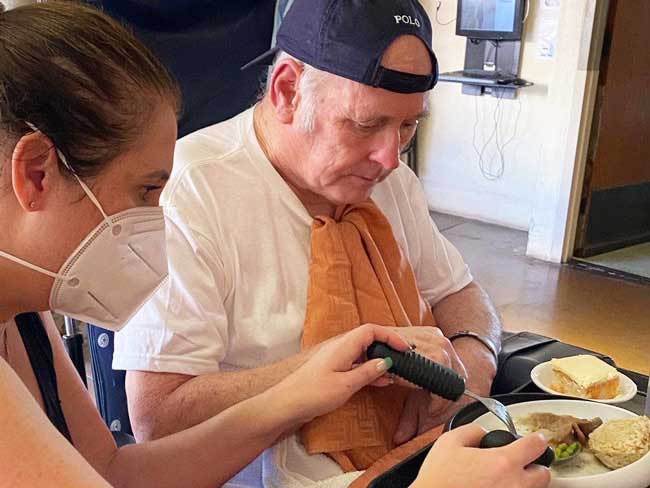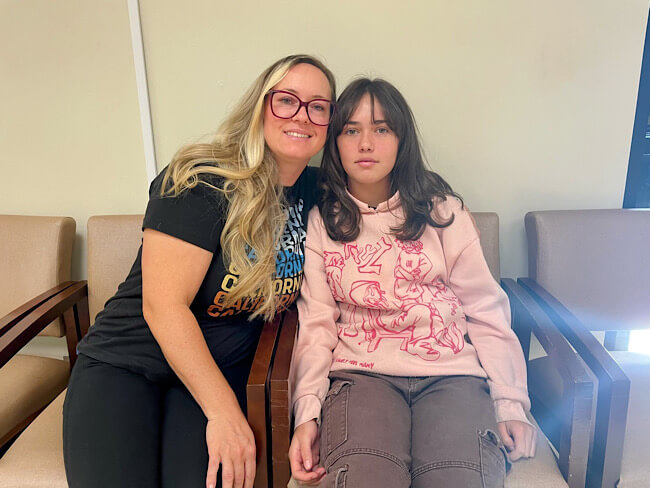Reducing inequity with fruits and vegetables
Black Americans experience worse health outcomes compared to other populations. Adopting plant-based diets can go a long way in reducing those inequitable outcomes.
Plant-based foods are nutritious and can taste just as delicious as meals that include meat.
“For many of my patients, it has been a lifesaver,” said Columbus Batiste, MD, regional chief of cardiology for Kaiser Permanente in Southern California. No, he’s not speaking of a new heart medication or strenuous exercise routine — he’s talking about cutting meat out of your diet and increasing your intake of fiber-rich plant-based foods.
“A plant-based diet is nutritious, and it can be just as tasty as a diet that includes meat,” said Dr. Batiste.
Dr. Batiste’s recommendation to switch to a plant-based diet applies to all populations, but, during Minority Health Month in April, we acknowledge health disparities and recommit to reducing inequities and improving health outcomes. In the United States, studies have shown that the intake of vegetables, whole grains, milk, dietary fiber, and other nutrients is lower among Black people than white people. In addition, Black people continue to face inequities that contribute to high levels of diabetes, hypertension, heart disease, and certain cancers. However, growing research suggests that adopting a plant-based diet could greatly improve health outcomes for Black Americans.
A diet backed by science
It’s widely known that diets lacking essential nutrition contribute to a host of health issues. Research shows that unhealthy diets containing too much salt and too few whole grains and fruits cause more deaths than tobacco smoking, highlighting a desperate need for change.
Dr. Batiste highlights research that shows plant-based diets are associated with lower rates of cardiovascular disease in people of all ages, sexes, and races, including Black Americans. Studies that specifically focus on Black Americans show that a whole-food, plant-based program can help participants lose weight, lower blood pressure, and improve cholesterol levels.
Sticking to the diet as closely as possible is important, said Dr. Batiste, who added, “Individuals who closely adhere to the diet demonstrate a 16% lower risk of death as well as a reduced susceptibility to heart attacks and strokes compared to those who don’t stick to the diet as closely.”
Plant-based diets: lifestyle or lifesaver?
Some surveys report that Black Americans are choosing vegan or vegetarian diets at higher rates than the broader population. By opting for plant-based diets, Black Americans can make significant strides toward achieving better health and overall well-being, to potentially reduce health inequities.
Learn more about the benefits of adopting a plant-based diet.
-
Social Share
- Share Reducing Inequity With Fruits and Vegetables on Pinterest
- Share Reducing Inequity With Fruits and Vegetables on LinkedIn
- Share Reducing Inequity With Fruits and Vegetables on Twitter
- Share Reducing Inequity With Fruits and Vegetables on Facebook
- Print Reducing Inequity With Fruits and Vegetables
- Email Reducing Inequity With Fruits and Vegetables

May 19, 2025
Member praises 50 years of collaboration with care teams
Karen Hansen’s doctors and clinicians have partnered with her to customize …

May 7, 2025
How to cope with anxiety after childbirth
As a new mother, Cherissa Ong was overwhelmed by stress. A mental health …

April 30, 2025
From fighter to father: How addiction care changed his life
Travis Taylor has substance use disorder and mental health conditions. …

April 25, 2025
Treating the heart and lungs together for a rare disease
With her medical teams working together, Sirina Hazeem is getting her life …

April 10, 2025
3 healthy eating tips for a healthier you
No matter your nutrition goals, discover how variety, personalized nutrition, …

March 27, 2025
Living proof: Colon cancer highly treatable if caught early
There is an alarming rise in colon cancer rates among younger adults. Cynthia …

March 27, 2025
We’re committed to mentorship, mental health, and communities
Kaiser Permanente awarded Elevate Your G.A.M.E. a grant to expand program …

March 25, 2025
AI in health care: 7 principles of responsible use
These guidelines ensure we use artificial intelligence tools that are safe …

March 17, 2025
Remembering Bill Coggins and his lasting legacy
The founder of the Kaiser Permanente Watts Counseling and Learning Center …

March 7, 2025
High blood pressure during pregnancy is on the rise
The keys to preventing cardiovascular conditions during pregnancy are knowing …

March 7, 2025
Kaiser Permanente in Hawaii cures 1,000th patient with hepatitis C
The milestone highlights its Viral Hepatitis Clinic's crucial role in addressing …

February 27, 2025
‘The heart attack that saved my life’
A sudden heart attack led Mark Twichel to seek care at Kaiser Permanente …

February 26, 2025
Colon cancer: Do you need to be screened?
If you’re age 45 or older, getting checked regularly for colorectal cancer …

February 21, 2025
Broken heart syndrome: What to know
NPR

February 20, 2025
Kaiser Permanente joins Food Is Medicine Colorado coalition
As an inaugural member, Kaiser Permanente will help lead health care’s …

February 18, 2025
I just need a chance
Billy Cardosi spent his life putting his family and job first. Then a heart-rela …

February 14, 2025
A fulfilling life on the other side of ovarian cancer
As a wife and a mother, Autumn Gray was determined to beat cancer to be …

February 4, 2025
What is therapy, anyway?
At Kaiser Permanente, our care is personalized for each patient's mental …

February 3, 2025
From a routine appointment to a cardiac crisis
An irregular heartbeat revealed that Enrique Medina had a serious heart …

January 29, 2025
A happy heart is a healthy heart
A cardiologist offers tips to help you improve your health and prevent …

January 15, 2025
After surgery, home was where his heart was
Virtual cardiac rehabilitation offers Mike Erskine a convenient, safe way …

December 26, 2024
How telehealth can make life easier for people with cancer
Virtual care connects cancer patients like Rob Tufel to a wide range of …

December 26, 2024
Linking isolated communities to care
A collaborative partnership, powered by trusted nonprofit partners, brings …

November 26, 2024
How to reduce your risk of stroke
A Kaiser Permanente doctor and researcher shares the simple changes you …

November 18, 2024
The power of early detection and proactive men’s health
A father's determination to stay healthy for his 3 children led him to …

November 13, 2024
Self-care for caregivers matters: Here’s why
A sharp increase in rates of adult caregiving is taking a mental and physical …

November 12, 2024
Surviving lung cancer as a nonsmoker
As a lifelong nonsmoker, Mariann Stephens was shocked to learn she had …

November 11, 2024
Medicare telehealth flexibilities should be here to stay
We urge Congress to extend policies that have improved access to care and …

November 11, 2024
Health care coverage now accessible to uninsured people
Indigenous farmworkers may qualify for new Kaiser Permanente coverage.

November 6, 2024
A best place to work for veterans
As a 2024 top Military Friendly Employer, Kaiser Permanente supports veterans …

October 29, 2024
How poor sleep can hurt your heart
An interview with Kaiser Permanente sleep expert Clarisse Glen, MD, sheds …

October 29, 2024
That’s not tennis elbow
A Kaiser Permanente physician thought he pinched a nerve during a tennis …

October 23, 2024
Doomscrolling? It may affect your heart.
Endless bad news is just one fingertip away online. One Kaiser Permanente …

October 23, 2024
Emotional eating: What it is and how to stop it
Ask yourself a few questions to figure out if you’re using food to try …

October 15, 2024
107-year-old member credits Kaiser Permanente for longevity
Bettye Garrett’s personal doctor says her healthy perspective on life’s …

October 15, 2024
Our dedication to fostering well-being and equity
The 2023 Kaiser Permanente Southern California Community Health County …

October 8, 2024
It started with a bad feeling
In August 2023, John Lynn collapsed at work. For the next year, he fought …

October 4, 2024
Teacher learns about herself and how to live with anxiety
A lifelong educator seeks behavioral health care to manage repetitive worries, …

October 1, 2024
From depression to connection: Older adult finds her way
After a long period of loneliness and isolation, Roberta Maguire gets the …

September 20, 2024
Ovarian cancer journey confirmed nursing student's calling
Miriam Gutierrez was diagnosed with late-stage ovarian cancer at age 31. …

September 18, 2024
More than 100 ‘Top Docs’ recognized in Washington state
Kaiser Permanente celebrates doctors and nurse practitioners recognized …

September 17, 2024
A Latina’s voice in mental health is impactful with her clients
Connecting through a shared heritage gives one therapist a unique perspective …

September 17, 2024
Playing on after 2 decades of cancer care
With the support of his health care team and nurse navigator, musician …

September 17, 2024
Groundbreaking at new medical offices in Pueblo
The new Pueblo North Medical Offices will replace the existing facility …

September 16, 2024
Voting affects the health of our communities
In honor of National Voter Registration Day, we encourage everyone who …

September 6, 2024
Navigating a world turned upside down after heart failure
After a life-threatening series of heart attacks at age 57, Bunnell Fockler …

August 30, 2024
Mindfulness: A lasting approach to healthy eating
Taking time to focus while you eat can help you avoid overeating.

August 29, 2024
After Stage 4 ovarian cancer, she’s still going strong
Donna Budway received prompt surgery followed by chemotherapy. She credits …

August 29, 2024
Neurosurgery and a deep, enduring doctor-patient relationship
A basketball coach’s remarkable story of undergoing brain tumor surgery …

August 28, 2024
Making breastfeeding work: A second-time mom’s journey
Support from a dedicated care team helps Tiffany Anonye breastfeed her …

August 27, 2024
From sore throats to ice cream floats
A mother and daughter share a special bond after undergoing tonsillectomies …

August 15, 2024
Back home one day after heart surgery
Ed Dalmasso needed an aortic valve replacement. His care team provided …

August 6, 2024
For a father with prostate cancer, knowledge is power
Harold Newman had advanced prostate cancer. Genetic testing helped expand …

August 1, 2024
Kaiser Permanente tops Colorado ‘Top Doctors’ list
5280 Magazine named 332 Kaiser Permanente physicians to its annual Top …

July 16, 2024
Teacher residency program improves retention and diversity
A $1.5 million Kaiser Permanente grant addresses Colorado teacher shortage …

July 10, 2024
We help members lower their risk of heart attacks and strokes
A Southern California program, powered by our connected care model, is …

July 10, 2024
Grant to help make school lunches healthier for kids
Chef Ann Foundation will use $275,000 grant for Colorado program to convert …

June 25, 2024
Prompt postpartum care saves a baby’s life
When a newborn was diagnosed with meningitis, a life-threatening infection …

June 19, 2024
Investments in Black community promote total health for all
Funding from Kaiser Permanente in Washington helps to promote mental health, …

June 13, 2024
Conquered 2 cancers while climbing mountains
Chris Hogan faced kidney cancer and prostate cancer at the same time. He …

May 31, 2024
Stage 4 lung cancer: A story of hope
A young father is enjoying “bonus time” with his kids thanks to new targeted …

May 21, 2024
Surviving stage 4 lung cancer with immunotherapy treatment
Patients like Carol Pitman are living longer thanks to advances in lung …

May 7, 2024
Can the badly broken prescription drug market be fixed?
Prescription drugs are unaffordable for millions of people. With the right …

May 1, 2024
Tacoma ALS clinic recognized for high-quality care
Patients with amyotrophic lateral sclerosis, also called Lou Gehrig’s disease, …

April 12, 2024
It’s time to address America’s Black maternal health crisis
Health care leaders and policymakers should each play their part to help …

April 10, 2024
For a new mom, talking about her worries helped her heal
One in 5 people experience depression, anxiety, or other mental health …

April 9, 2024
Denver Fire Department annual blood work screenings triple
It’s easy to put off recommended health screenings, and sometimes even …

April 1, 2024
Lynch syndrome: Managing the risk of hereditary colon cancer
Lynch syndrome is a gene mutation that increases colon cancer risk. Learn …

March 29, 2024
Faster recovery: From cardiac scare to exploring Italy
Virtual cardiac rehab helped Mike Kelly heal at home after a life-threatening …

March 20, 2024
Life after cancer: Surviving and thriving
A healthy life after cancer is possible. Learn how Kaiser Permanente helps …

March 18, 2024
Program helps member prioritize her health
Medical Financial Assistance program supports access to health care.

March 14, 2024
Healthy kidneys support overall good health
Kaiser Permanente excels in preventing, detecting, and treating kidney …

March 14, 2024
Midwife offers personal care for mom facing complications
For Sam Beeson, having a midwife at her side during her pregnancy helped …

March 12, 2024
In-home recovery restores harmony to life
Colorado musician back with the band thanks to new virtual cardiac rehab …

March 6, 2024
Former employee honored for supporting South LA families
Bill Coggins, who founded the Kaiser Permanente Watts Counseling and Learning …

March 5, 2024
Researchers look for ways to find pancreatic cancer early
Early detection of the disease, before it becomes advanced, will increase …

March 4, 2024
Taking care of Special Olympics athletes
Kaiser Permanente physicians and medical students provide medical exams …

February 22, 2024
The journey of a lifetime
Care teams at Kaiser Permanente Fontana Medical Center helped Phillip Crawford …

February 21, 2024
From planning his funeral to celebrating his wedding
Gabriel Abarca had no hope for his future. Then the team at Kaiser Permanente …

February 21, 2024
Recovering at home after a double mastectomy
Innovative surgical recovery program helps breast cancer patients safely …

February 2, 2024
Expanding medical, social, and educational services in Watts
Kaiser Permanente opens medical offices and a new home for the Watts Counseling …

January 26, 2024
Retiree back in the swing of things after heart procedure
Tookie Gentilcore returns to enjoying life thanks to a quick, safe method …

January 17, 2024
How diabetes can affect your heart
People with diabetes are more likely to have heart disease.

January 10, 2024
‘You don’t know unless you ask them’
Kaiser Permanente’s Patient Advisory Councils help us create exceptional …

December 20, 2023
Championing inclusivity at the Fall Games
Kaiser Permanente celebrates inclusion at Special Olympics Southern California …

December 19, 2023
Life-changing care for patients who experience strokes
In Oregon, our stroke teams are providing patients with industry-leading …

December 19, 2023
Determined to drop the weight and stop the cycle of diabetes
Following a COVID-19-related hospital stay, Robert DeLeon took charge of …

December 15, 2023
Family-centered care, through pregnancy and beyond
Members experiencing a low risk pregnancy have the option of having their …

December 7, 2023
Safe, secure housing is a must for health
We offer housing-related legal help to prevent evictions and remove barriers …

December 6, 2023
Video prenatal visits are a boon for a busy working mom
A new care option offers a mix of in-person and virtual visits, supported …

December 6, 2023
Solid foundation: How construction careers support health
Steady employment can improve a person's health and well-being. Our new …

December 1, 2023
Surviving — and thriving — after cancer
From diagnosis to recovery, David Parsons, MD, shares how screening, treatment, …

November 17, 2023
Expert advice on keeping your heart healthy
Dr. Yong Shin shares how people with heart disease can live longer, while …

November 16, 2023
Providing a bridge to heart transplant
The use of a ventricular assist device implant gives one Oregon woman the …

November 15, 2023
Care at home: Giving patients what they want
Our Advanced Care at Home program provides high-quality, safe care in familiar, …

November 13, 2023
Take a deep breath (we can help with that)
It’s never too late to quit smoking. At Kaiser Permanente, we can help …

November 1, 2023
Meet our 2023 to 2024 public health fellows
To help develop talented, diverse community leaders, Kaiser Permanente …

October 25, 2023
Breast cancer during pregnancy: Caring for mom and baby
A team of specialists treats an expecting mother’s cancer while keeping …

October 24, 2023
Childhood anxiety: What parents need to know
A child and adolescent psychiatrist shares tips on supporting your child …

October 23, 2023
A renewed sense of purpose after surviving breast cancer
Joy Short, a Kaiser Permanente member and employee, turned her breast cancer …